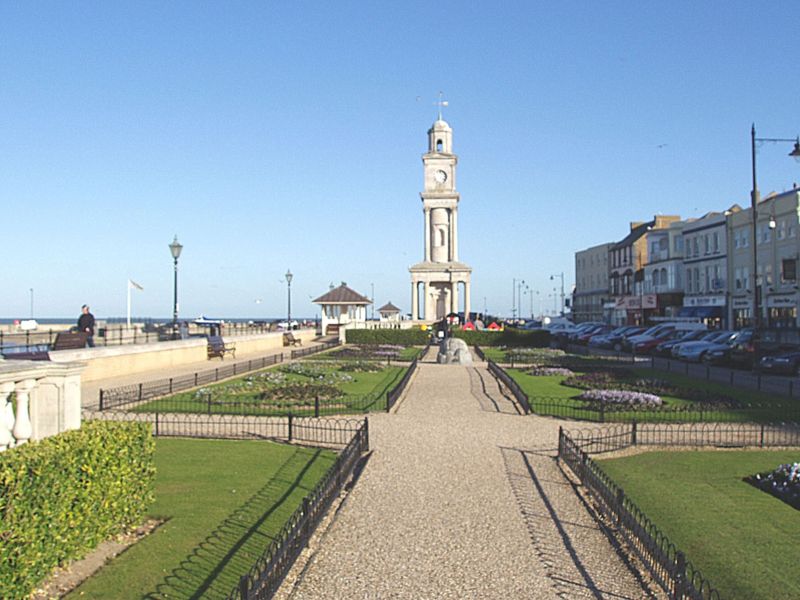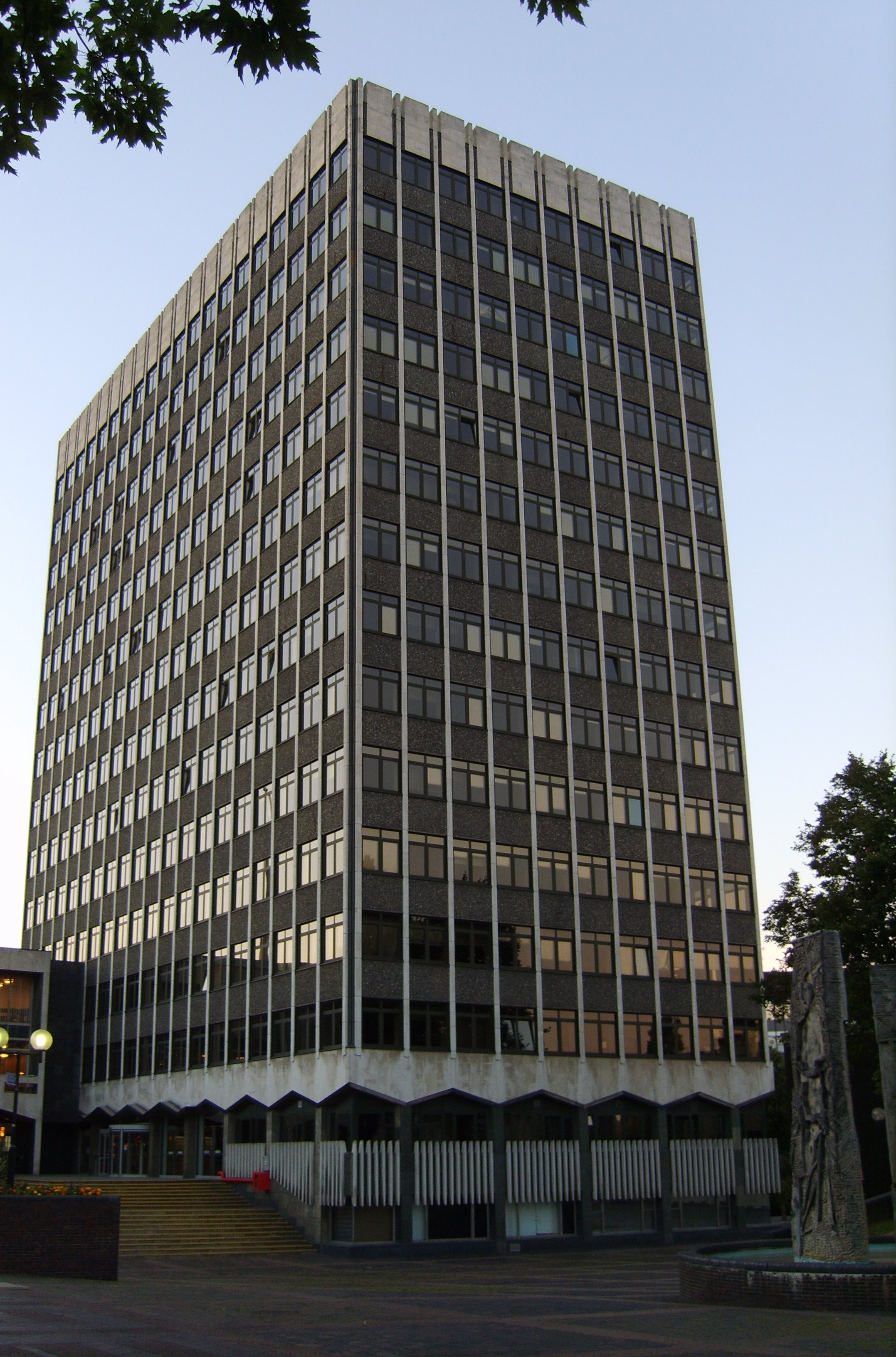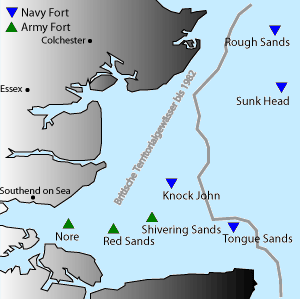|
Herne Bay
Herne Bay is a seaside town on the north coast of Kent in South East England. It is north of Canterbury and east of Whitstable. It neighbours the ancient villages of Herne and Reculver and is part of the City of Canterbury local government district, although it remains a separate town with countryside between it and Canterbury. Herne Bay's seafront is home to the world's first freestanding purpose-built Clock Tower, built in 1837. From the late Victorian period until 1978, the town had the second-longest pier in the United Kingdom.Herne Bay Pier at www.theheritagetrail.co.uk (accessed 7 July 2008) The town began as a small shipping community, receiving goods and passengers from London en route to Canterbury and |
Clock Tower, Herne Bay
The Clock Tower, Herne Bay (built 1837), is a Grade II listed landmark in Herne Bay, Kent, England. It is believed to be one of the earliest purpose-built, free-standing clock towers in the United Kingdom. It was funded by Mrs Ann Thwaytes, and now serves as a memorial to the fallen of the Second Boer War. The benefactor At the time of the erection of the Clock Tower, Ann Thwaytes (1789–1866) was the rich widow of London grocer William Thwaytes.Mike Bundock, ''Victorian Herne Bay'' (Herne Bay, Kent, Pierhead Publications Ltd, 1 February 2011), p.18, . Between 1834 and 1840 she visited Herne Bay regularly with friends, staying with Mr Camplin who owned number 8 (now 30) Marine Terrace on Central Parade, and became an established town benefactor of Herne Bay.Herne Bay Cultural Trail: Cl ... [...More Info...] [...Related Items...] OR: [Wikipedia] [Google] [Baidu] |
United Kingdom Census 2011
A Census in the United Kingdom, census of the population of the United Kingdom is taken every ten years. The 2011 census was held in all countries of the UK on 27 March 2011. It was the first UK census which could be completed online via the Internet. The Office for National Statistics (ONS) is responsible for the census in England and Wales, the General Register Office for Scotland (GROS) is responsible for the census in Scotland, and the Northern Ireland Statistics and Research Agency (NISRA) is responsible for the census in Northern Ireland. The Office for National Statistics is the executive office of the UK Statistics Authority, a non-ministerial department formed in 2008 and which reports directly to Parliament. ONS is the UK Government's single largest statistical producer of independent statistics on the UK's economy and society, used to assist the planning and allocation of resources, policy-making and decision-making. ONS designs, manages and runs the census in England an ... [...More Info...] [...Related Items...] OR: [Wikipedia] [Google] [Baidu] |
Herne Bay Clock Tower
{{disambiguation, geo ...
Herne may refer to: Places Australia * Herne Hill, Victoria * Herne Hill, Western Australia, a suburb of Perth * Riverwood, New South Wales, formerly known as Herne Bay England * Herne, Kent, near the town of Herne Bay * Herne Bay, seaside town located in southeastern Kent * Herne Common, Kent * Herne Hill in London Elsewhere * Herne, Belgium * Herne, North Rhine-Westphalia, Germany * Herne Bay, New Zealand, a suburb of Auckland Other uses * Herne (surname) * Herne the Hunter, an English mythological figure said to haunt Windsor Forest See also *Ahearn *Aherne *Hearn (other) * Herne Bay (other) *Hernes Hernes is a surname. Notable people with the surname include: *Gudmund Hernes (born 1941), Norwegian politician * Helga Hernes (born 1938), German-born Norwegian political scientist, diplomat, and politician See also *Herne (other) Her ... [...More Info...] [...Related Items...] OR: [Wikipedia] [Google] [Baidu] |
Edward Heath
Sir Edward Richard George Heath (9 July 191617 July 2005), often known as Ted Heath, was a British politician who served as Prime Minister of the United Kingdom from 1970 to 1974 and Leader of the Conservative Party from 1965 to 1975. Heath also served for 51 years as a Member of Parliament from 1950 to 2001. Outside politics, Heath was a yachtsman, a musician, and an author. Born to a lady's maid and a carpenter, Heath was educated at a grammar school in Ramsgate, Kent ( Chatham House Grammar School for boys) and became a leader within student politics while studying at the University of Oxford. He served as an officer in the Royal Artillery during the Second World War. He worked briefly in the Civil Service, but resigned in order to stand for Parliament, and was elected for Bexley at the 1950 election. He was promoted to become Chief Whip by Anthony Eden in 1955, and in 1959 was appointed to the Cabinet by Harold Macmillan as Minister of Labour. He later held the role o ... [...More Info...] [...Related Items...] OR: [Wikipedia] [Google] [Baidu] |
The Landward End Of Herne Bay Pier
''The'' () is a grammatical article in English, denoting persons or things that are already or about to be mentioned, under discussion, implied or otherwise presumed familiar to listeners, readers, or speakers. It is the definite article in English. ''The'' is the most frequently used word in the English language; studies and analyses of texts have found it to account for seven percent of all printed English-language words. It is derived from gendered articles in Old English which combined in Middle English and now has a single form used with nouns of any gender. The word can be used with both singular and plural nouns, and with a noun that starts with any letter. This is different from many other languages, which have different forms of the definite article for different genders or numbers. Pronunciation In most dialects, "the" is pronounced as (with the voiced dental fricative followed by a schwa) when followed by a consonant sound, and as (homophone of the archaic pr ... [...More Info...] [...Related Items...] OR: [Wikipedia] [Google] [Baidu] |
Southend-on-Sea
Southend-on-Sea (), commonly referred to as Southend (), is a coastal city and unitary authorities of England, unitary authority area with Borough status in the United Kingdom, borough status in southeastern Essex, England. It lies on the north side of the Thames Estuary, east of central London. It is bordered to the north by Rochford (district), Rochford and to the west by Castle Point. It is home to the longest pleasure pier in the world, Southend Pier. London Southend Airport is located north of the city centre. Southend-on-Sea originally consisted of a few poor fishermen's huts and farms at the southern end of the village of Prittlewell. In the 1790s, the first buildings around what was to become the High Street of Southend were completed. In the 19th century, Southend's status of a seaside resort grew after a visit from Princess Caroline of Brunswick, and Southend Pier was constructed. From the 1960s onwards, the city declined as a holiday destination. Southend redeveloped ... [...More Info...] [...Related Items...] OR: [Wikipedia] [Google] [Baidu] |
The Dam Busters (film)
''The Dam Busters'' is a 1955 British epic war film starring Richard Todd and Michael Redgrave. It was directed by Michael Anderson. The film recreates the true story of Operation Chastise when in 1943 the RAF's 617 Squadron attacked the Möhne, Eder, and Sorpe dams in Nazi Germany with Barnes Wallis's ''bouncing bomb''. The film was based on the books '' The Dam Busters'' (1951) by Paul Brickhill and ''Enemy Coast Ahead'' (1946) by Guy Gibson. The film's reflective last minutes convey the poignant mix of emotions felt by the characters – triumph over striking a successful blow against the enemy's industrial base is tempered by the sobering knowledge that many died in the process of delivering it. The film was widely praised and became the most popular motion picture at British cinemas in 1955. In 1999, the British Film Institute voted ''The Dam Busters'' the 68th greatest British film of the 20th century. Its depiction of the raid, along with a similar sequence in th ... [...More Info...] [...Related Items...] OR: [Wikipedia] [Google] [Baidu] |
Bouncing Bomb
A bouncing bomb is a bomb designed to bounce to a target across water in a calculated manner to avoid obstacles such as torpedo nets, and to allow both the bomb's speed on arrival at the target and the timing of its detonation to be pre-determined, in a similar fashion to a regular naval depth charge. The inventor of the first such bomb was the British engineer Barnes Wallis, whose "Upkeep" bouncing bomb was used in the RAF's Operation Chastise of May 1943 to bounce into German dams and explode under water, with effect similar to the underground detonation of the Grand Slam and Tallboy earthquake bombs, both of which he also invented. British bouncing bombs After the outbreak of the Second World War in 1939, Wallis saw strategic bombing as the means to destroy the enemy's ability to wage war and he wrote a paper entitled "A Note on a Method of Attacking the Axis Powers". Referring to the enemy's power supplies, he wrote (as Axiom 3): "If their destruction or paralysis ca ... [...More Info...] [...Related Items...] OR: [Wikipedia] [Google] [Baidu] |
Maunsell Forts
The Maunsell Forts are armed towers built in the Thames and Mersey estuaries during the Second World War to help defend the United Kingdom. They were operated as army and navy forts, and named after their designer, Guy Maunsell. The forts were decommissioned in the late 1950s and later used for other activities including pirate radio broadcasting. One of the forts is managed by the unrecognised Principality of Sealand; boats visit the remaining forts occasionally, and a consortium called Project Redsands is planning to conserve the fort situated at Red Sands. In the summers of 2007 and 2008 Red Sands Radio, a station commemorating the pirate radio stations of the 1960s, operated from the Red Sands fort on 28-day Restricted Service Licences. The fort was subsequently declared unsafe, and Red Sands Radio has moved its operations ashore to Whitstable. Forts had been built in river mouths and similar locations to defend against ships, such as the Grain Tower Battery at the ... [...More Info...] [...Related Items...] OR: [Wikipedia] [Google] [Baidu] |
Doctor Who
''Doctor Who'' is a British science fiction television series broadcast by the BBC since 1963. The series depicts the adventures of a Time Lord called the Doctor, an extraterrestrial being who appears to be human. The Doctor explores the universe in a time-travelling space ship called the TARDIS. The TARDIS exterior appears as a blue British police box, which was a common sight in Britain in 1963 when the series first aired. With various companions, the Doctor combats foes, works to save civilisations, and helps people in need. Beginning with William Hartnell, thirteen actors have headlined the series as the Doctor; in 2017, Jodie Whittaker became the first woman to officially play the role on television. The transition from one actor to another is written into the plot of the series with the concept of regeneration into a new incarnation, a plot device in which a Time Lord "transforms" into a new body when the current one is too badly harmed to heal normally. ... [...More Info...] [...Related Items...] OR: [Wikipedia] [Google] [Baidu] |
George Joseph Smith
George Joseph Smith (11 January 1872 – 13 August 1915) was an English serial killer and bigamist who was convicted and subsequently hanged for the murders of three women in 1915, the case becoming known as the Brides in the Bath Murders. As well as being widely reported in the media, the case was significant in the history of forensic pathology and detection. It was also one of the first cases in which similarities between connected crimes were used to prove deliberation, a technique used in subsequent prosecutions. Early life and marriages The son of an insurance agent, George Joseph Smith was born in Bethnal Green, London. He was sent to a reformatory at Gravesend, Kent, at age 9 and later served time for swindling and theft. In 1896, Smith was imprisoned for twelve months for persuading a woman to steal from her employers. He used the proceeds to open a baker's shop in Leicester. In 1898, under the alias George Oliver Love, Smith married Caroline Beatrice Thornhill ... [...More Info...] [...Related Items...] OR: [Wikipedia] [Google] [Baidu] |
Wherry
A wherry is a type of boat that was traditionally used for carrying cargo or passengers on rivers and canals in England, and is particularly associated with the River Thames and the River Cam. They were also used on the Broadland rivers of Norfolk and Suffolk. Regional usage in Great Britain London passenger wherries evolved into the Thames skiff, a gentleman's rowing boat. Wherries were clinker-built with long overhanging bows so that patrons could step ashore dryshod before landing stages were built along the river. It is the long angled bow that distinguishes the wherry and skiff from the gig and cutter which have steeper bows following the rise of the Royal Navy, and the building of landing stages. The use of wherries on the River Cam in Cambridge was common and is described by Daniel Defoe in his journey through England. The use of wherries on the River Cam preceded the popularity of punting by Cambridge University students. By the late 18th century, a name was gi ... [...More Info...] [...Related Items...] OR: [Wikipedia] [Google] [Baidu] |


.png)



.jpg)
